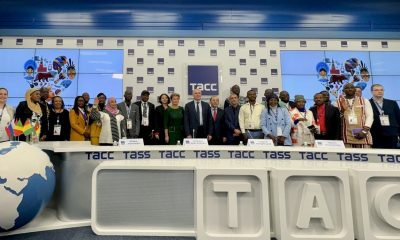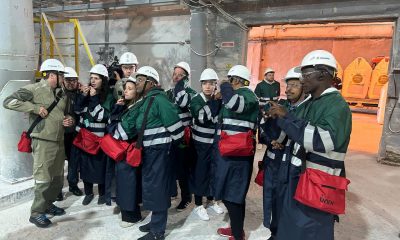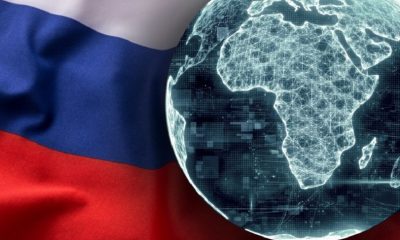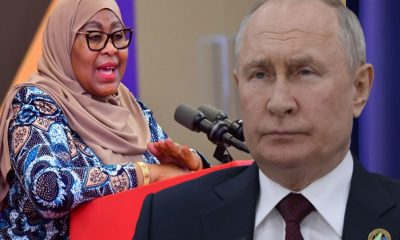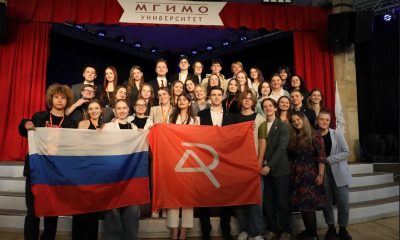World
Russia-African Relations in the Context of Geopolitical Changes
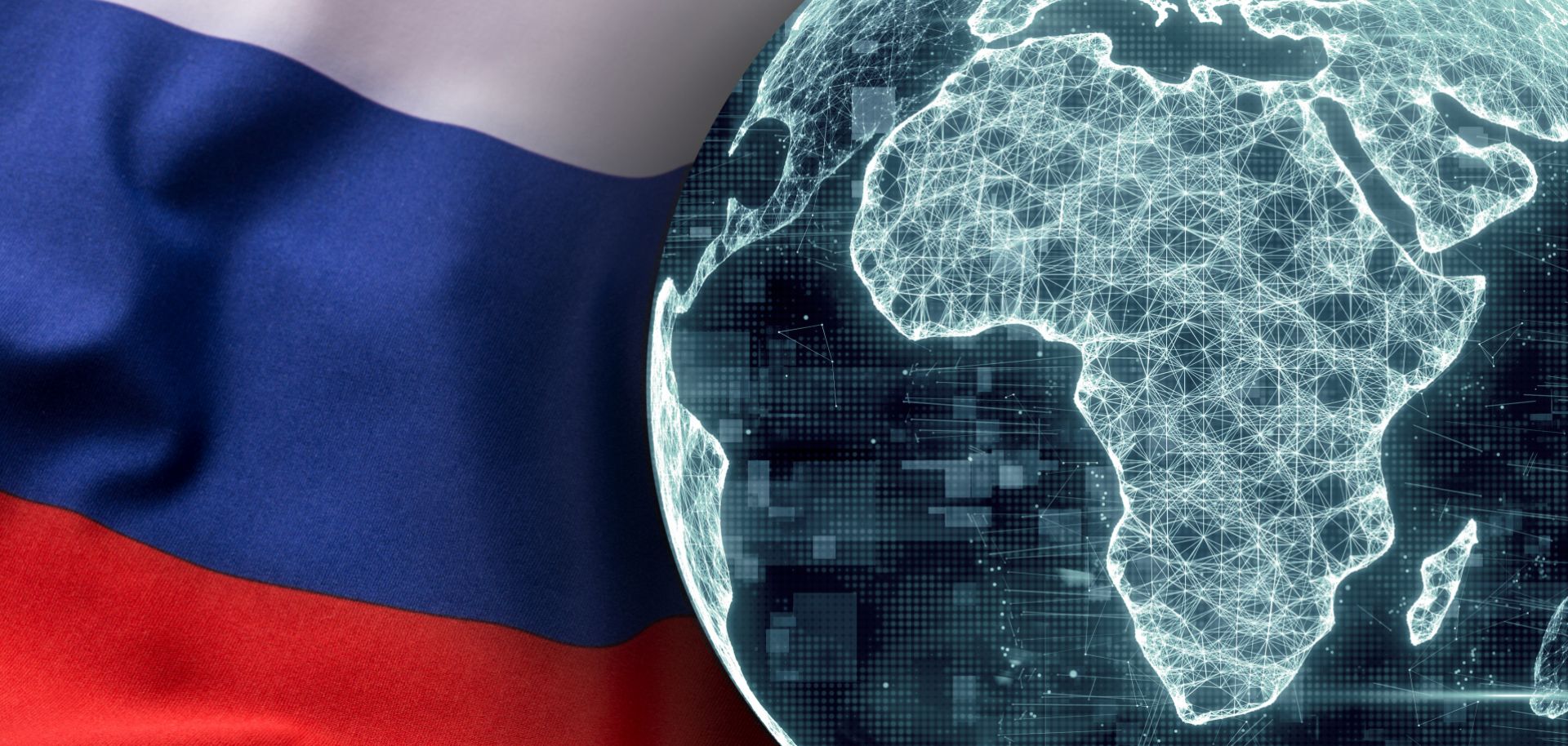
By Kester Kenn Klomegah
Russia needs to go beyond its traditional rhetoric of Soviet assistance rendered to Africa. It is important now to highlight concrete success stories and policy achievements, at least, during the past decade in Africa. The young generation and the middle class aged between 25 and 45 that make up the bulk of the 1.3 population hardly see the broad positive impact of Russia’s economic cooperation with Africa.
Russia plans to hold the second Russia-Africa summit later this year. Sergey Lavrov, Minister of Foreign Affairs of the Russian Federation, indicated in a mid-June message that “in these difficult and crucial times the strategic partnership with Africa has become a priority of Russia’s foreign policy. Russia highly appreciates the readiness of Africans to further step up economic cooperation.”
Lavrov said: “It is in the interests of our people to work together to preserve and expand mutually beneficial trade and investment ties under these new conditions. It is important to facilitate the mutual access of Russian and African economic operators to each other’s markets and encourage their participation in large-scale infrastructure projects. The signed agreements and the results will be consolidated at the forthcoming second Russia-Africa summit.”
The above statement arguably offers some implications especially discussing this question of relationship-building. Lavrov has aptly asserted that within the “emerging and sustainable polycentric architecture of the world order” relations with Africa are still a priority, but Russians always close their eyes to the fact that the country’s foreign policy in Africa has largely failed to pronounce itself, in practical terms, as evidenced by the countable forays into Africa by Russian officials.
The Soviet Union was quite extensively engaged with Africa, comparatively. Russians have only been criticizing other foreign players during the past two decades without showing any model of building relationships. Its foreign policy goals are directed simply at sustaining the passion for signing several MoUs and bilateral agreements with African countries.
During the past years, there have been several symbolic meetings of bilateral intergovernmental commissions both in Moscow and in Africa. The first historic summit discussed broadly the priorities and further identified opportunities for collaboration. It, however, requires understanding the tasks and the emerging challenges. The current functions should concretely focus on actionable strategies towards enhancing the effective implementation of existing bilateral agreements, taking practical collaborated actions leading to goal-driven results. Nevertheless, Lavrov hopes “the signed agreements and the results will be consolidated at the forthcoming second Russia-Africa summit.”
Still, Russia plays very little role in Africa’s infrastructure, agriculture and industry, and especially making efforts to leverage the African Continental Free Trade Area (AfCFTA). While, given its global status, it ought to be active in Africa as Western Europe, the European Union, America and China are, it is all but absent, playing a negligible role, according to Professor Gerrit Olivier at the Department of Political Sciences, University of Pretoria, and former South African Ambassador to the Russian Federation.
Researchers have been making tangible contributions to the development of African studies in Russia. This Moscow-based Africa Institute has a huge pack of research materials useful for designing an African agenda.
In an interview, Professor Vladimir Shubin at the Institute for African Studies, Russian Academy of Sciences reiterated that Russia is not doing enough to communicate to the broad sectors of the public, particularly in Africa, true information about its domestic and foreign policies as well as the accomplishments of Russia’s economy, science and technology to form a positive perception of Russia within the context of the current global changes of the 21st century.
As to Russia’s involvement, it has undoubtedly a vast experience in the development of projects in Africa accumulated during Soviet times, the building of power stations and dams and creating technical training institutes. What is lacking nowadays is its ability to provide large investments, according to Shubin, “but Russian expertise and technology can still be used while carrying out internationally-financed projects in Africa.”
As to the failures, perhaps, we have to point to the lack of deep knowledge of African conditions, especially at the initial stage of the involvement which sometimes resulted in suggesting (or agreeing to) unrealistic projects, But there are good prospects for reactivating diversified cooperation, he explained.
Chronological analysis shows that Russia’s politics toward Africa under President Boris Yeltsin (1991-2001) was described as a lost decade, both in internal and external affairs, including relations with Africa.
Historical documents further show that after the Soviet collapse, there were approximately 380 projects throughout Africa. In the early 1990s, Russia swiftly exited, closed several diplomatic offices and abandoned all these and hardly any sign of Soviet-era infrastructure projects there.
Policy statements have indicated strong optimism for raising relations. , however, at least during the past decade, official reports including sparkling speeches at high-level conferences, summits and meetings indicated projects are being implemented in Africa by such leading Russian businesses as Rosneft, Lukoil, Rosgeo, Gazprom, Alrosa, Vi Holding, GPB Global Resources and Renova.
Nevertheless, it is so common to reiterate that Russia has always been on Africa’s side in the fight against colonialism. The frequency of reminding again and again about Soviet assistance, that was offered more than 60 years ago, will not facilitate the expected beneficial trade and investment ties under these new conditions. The United Nations declared Africa fully independent in 1960, and the Organization of African Unity (OAU) was formed on 25 May 1963 in Addis Ababa, Ethiopia.
Afreximbank President and Chairman of the Board of Directors, Dr Benedict Okey Oramah, says Russian officials “keep reminding us about Soviet-era” but the emotional link has simply not been used in transforming relations.
Oramah said one of Russia’s major advantages was goodwill. He remarked that even young people in Africa knew how Russia helped African people fight for independence. “So an emotional link is there,” he told Inter-Tass News Agency.
The biggest thing that happened in Africa was the establishment of the African Continental Free Trade Area (AfCFTA). That is a huge game-changer, and steps have been made lately in the African countries for creating better conditions for business development and shaping an attractive investment climate.
“Sometimes, it is difficult to understand why the Russians are not taking advantage of it? We have the Chinese, we have the Americans, we have the Germans who are operating projects…That is a very, very promising area,” Oramah said in his interview last year.
Ahead of the Sochi summit 2019, Oramah presented a report to a particular business conference that ran from 18 to 22 June, the same year, and listed spheres for possible cooperation such as finances, energy, mining, railway infrastructure, digital technologies, cybersecurity, healthcare, education, food security in Africa.
That conference saw several agreements signed including between the African Export-Import Bank (Afreximbank) and Sinara-Transport Machines JSC (STM), Transmash Holding JSC, Russian Export Center JSC, Avelar Solar Technology LLC, Chelyabinsk Pipe Plant PJSC, Kolon World Investment, and Opaia SA and the Roscongress Foundation. As far back in 2017, the Russian Export Center became Afreximbank’s third-largest non-African shareholding financial organization shareholder and is expected to contribute to the acceleration of investment, trade, and economic relations between Russia and Africa.
It is interesting to note here that the Russian business community hardly pays attention to the significance of AfCFTA which provides a unique and valuable platform for businesses to access an integrated African market of over 1.3 billion people.
The growing middle class, among other factors, constitutes a huge market potential in Africa. The African continent currently has enormous potential as a market, and some experts say it is the last business frontier.
Many African countries are enacting economic reforms, demand is growing for high-quality, competitive products. Russian businesses are interested in this niche, but Russians are extremely slow. The snail-pace approach reflects their inability to determine financial instruments for supporting trade with and investment in Africa.
Accentuating the importance of multilateral cooperation between Russia and Africa, Advisor to the President of the Russian Federation, Anton Kobyakov, said: “The current situation in the world is such that we are witnesses to the formation of new centres of economic growth in Africa. Competition for African markets is growing accordingly. There is no doubt that Russia’s non-commodity exporters will benefit from cooperating with Africa on manufacturing, technologies, finances, trade, and investment.”
Kobyakov further pointed to modern Russia, which already has experience of successful cooperation with African countries under its belt, is ready to make an offer to the African continent that will secure mutually beneficial partnership and the joint realization of decades of painstaking work carried out by several generations of Soviet and Russian people.
With its impressive relations, Russia has not pledged publicly concrete funds toward implementing its policy objectives in Africa. Moreover, Russian officials have ignored the fact that Russia’s overall economic engagement is largely staggering, various business agreements signed are still not fulfilled, with many African countries.
Agreements and business negotiations resulted in 92 agreements, contracts and memoranda of understanding. Summit documents say a total of RUB 1.004 trillion (($12.5 billion) worth of agreements were signed at that highly-praised historic summit in October 2019.
Large Russian companies have been unsuccessful with their projects, negatively reflecting the real motives for bilateral economic cooperation. There are several examples such as Rosatom in South Africa, Norrick Nickel in Botswana, Ajaokuta Steel Plant in Nigeria, Mining projects in Uganda and Zimbabwe, and Lukoil in Cameroon, Nigeria and Sierra Leone. Currently, Russia is invisible in spheres providing infrastructures in Africa.
Undoubtedly, several Russian companies have largely underperformed in Africa, experts described was primarily due to multiple reasons. Most often, Russian investors strike important investment niches that still require long-term strategies and adequate country study. Grappling with reality, there are many investment challenges including official bureaucracy in Africa.
To ensure business safety and consequently take steps to realize the primary goals, it is necessary to attain some level of understanding of the priorities of the country, investment legislations, compliance with terms of agreement and a careful study of policy changes, particularly when there is a sudden change in government.
What is abundantly clear is how to stimulate African governments into exploring investment opportunities in Russia and also Russian investors in Africa within some framework of cooperation. In order to facilitate both Russian and African economic operators’ access to each other’s markets and encourage their participation in large-scale infrastructure projects must involve taking progressive practical steps toward resolving existing obstacles.
That said, preparations for the second Russia-Africa summit are currently underway. “The Russian side aims to continue preparing the second, as well as subsequent Russian-Africa summits and aims to make them as efficient as possible. The Russian Ministry of Foreign Affairs and other ministries are taking steps to build full and mutually beneficial cooperation between Russia and the African countries, including the formation of a reliable social and economic infrastructure, food and energy security on the continent,” said Oleg Ozerov, Ambassador-at-Large and Head of the Secretariat of the Russia-Africa Partnership Forum.
Worth saying here that African leaders are waiting to cut white ribbons marking the successful completion of Russian-managed something. It is time to shift from rhetoric and move on towards implementing the package of bilateral agreements, especially those involving infrastructure investments, determining financing concrete projects and delivering on decade-old pledges to the people of Africa.
While Russian and African leaders have common positions on the global platform, there is also the need to recognize and appreciate the welfare of the 1.3 billion population, the majority impoverished, in Africa. Significant to suggest that with new horizons of the polycentric world order emerging and steadily unfolding, active engagement of the African youth, civil society leaders and active changemakers in the middle-class in policy efforts becomes necessary.
With the youth’s education, some experts are still critical. Gordey Yastrebov, a Postdoctoral Researcher and Lecturer at the Institute for Sociology and Social Psychology at the University of Cologne (Germany), argues in an email interview discussion that “education can be a tool for geopolitical influence in general, and for changing perceptions specifically, and Russia (just like any other country) could use it for that same purpose. However, Russia isn’t doing anything substantial on this front, at least there is no consistent effort with obvious outcomes that would make me think so. There are no large-scale investment programs in education focusing on this.”
He explains that Russian education can become appealing these days, but given that Russia can no longer boast any significant scientific and technological achievements. Western educational and scientific paradigm embraces cooperation and critical independent thinking, whereas this is not the case with the Russian paradigm, which is becoming more isolationist and authoritarian. Obviously, by now, Africa should look up to more successful examples elsewhere, perhaps in the United States and Europe.
As official Russia’s Ministry of Foreign Affairs website indicated – it is evident that the significant potential of the economic cooperation is far from being exhausted, much remains to be done in creating the conditions necessary for interaction between Russia and Africa. At a meeting of the Ministry’s Collegium, Lavrov unreservedly suggested taking a chapter on the approach and methods adopted by China in Africa, and that was back in 2019.
Now at the crossroad, it could be meandering and longer than expected to make the mark. Russia’s return journey could take another generation to reach its destination, Africa. With the current changing geopolitical world, Russia has been stripped of as a member of many international organizations. As a direct result of Russia’s “special military operation” aims at “demilitarization and denazification” since late February, Russia has come under a raft of sanctions imposed by the United States and Canada, the European Union, Japan, Australia, New Zealand and the host of other countries.
World
African Visual Art is Distinguished by Colour Expression, Dynamic Form—Kalalb

By Kestér Kenn Klomegâh
In this insightful interview, Natali Kalalb, founder of NAtali KAlalb Art Gallery, discusses her practical experiences of handling Africa’s contemporary arts, her professional journey into the creative industry and entrepreneurship, and also strategies of building cultural partnership as a foundation for Russian-African bilateral relations. Here are the interview excerpts:
Given your experience working with Africa, particularly in promoting contemporary art, how would you assess its impact on Russian-African relations?
Interestingly, my professional journey in Africa began with the work “Afroprima.” It depicted a dark-skinned ballerina, combining African dance and the Russian academic ballet tradition. This painting became a symbol of cultural synthesis—not opposition, but dialogue.
Contemporary African art is rapidly strengthening its place in the world. By 2017, the market was growing so rapidly that Sotheby launched its first separate African auction, bringing together 100 lots from 60 artists from 14 foreign countries, including Algeria, Ghana, Mali, Nigeria, Senegal, and others. That same year during the Autumn season, Louis Vuitton Foundation in Paris hosted a major exhibition dedicated to African art. According to Artnet, sales of contemporary African artists reached $40 million by 2021, a 434% increase in just two years. Today, Sotheby holds African auctions twice a year, and in October 2023, they raised $2.8 million.
In Russia, this process manifests itself through cultural dialogue: exhibitions, studios, and educational initiatives create a space of trust and mutual respect, shaping the understanding of contemporary African art at the local level.
Do you think geopolitical changes are affecting your professional work? What prompted you to create an African art studio?
The international context certainly influences cultural processes. However, my decision to work with African themes was not situational. I was drawn to the expressiveness of African visual language—colour, rhythm, and plastic energy. This theme is practically not represented systematically and professionally in the Russian art scene.
The creation of the studio was a step toward establishing a sustainable platform for cultural exchange and artistic dialogue, where the works of African artists are perceived as a full-fledged part of the global cultural process, rather than an exotic one.
To what extent does African art influence Russian perceptions?
Contemporary African art is gradually changing the perception of the continent. While previously viewed superficially or stereotypically, today viewers are confronted with the depth of artistic expression and the intellectual and aesthetic level of contemporary artists.
Portraits are particularly impactful: they allow us to see not just an abstract image of a “continent,” but a concrete personality, character, and inner dignity. Global market growth data and regular auctions create additional trust in African contemporary art and contribute to its perception as a mature and valuable movement.
Does African art reflect lifestyle and fashion? How does it differ from Russian art?
African art, in my opinion, is at its peak in everyday culture—textiles, ornamentation, bodily movement, rhythm. It interacts organically with fashion, music, interior design, and the urban environment. The Russian artistic tradition is historically more academic and philosophical. African visual art is distinguished by greater colour expression and dynamic form. Nevertheless, both cultures are united by a profound symbolic and spiritual component.
What feedback do you receive on social media?
Audience reactions are generally constructive and engaging. Viewers ask questions about cultural codes, symbolism, and the choice of subjects. The digital environment allows for a diversity of opinions, but a conscious interest and a willingness to engage in cultural dialogue are emerging.
What are the key challenges and achievements of recent years?
Key challenges:
- Limited expert base on African contemporary art in Russia;
- Need for systematic educational outreach;
- Overcoming the perception of African art as exclusively decorative or ethnic.
Key achievements:
- Building a sustainable audience;
- Implementing exhibition and studio projects;
- Strengthening professional cultural interaction and trust in African
contemporary art as a serious artistic movement.
What are your future prospects in the context of cultural diplomacy?
Looking forward, I see the development of joint exhibitions, educational programs, and creative residencies. Cultural diplomacy is a long-term process based on respect and professionalism. If an artistic image is capable of uniting different cultural traditions in a single visual space, it becomes a tool for mutual understanding.
World
Ukraine Reveals Identities of Nigerians Killed Fighting for Russia

By Adedapo Adesanya
The Ukrainian Defence Intelligence (UDI) has identified two Nigerian men, Mr Hamzat Kazeem Kolawole and Mr Mbah Stephen Udoka, allegedly killed while fighting as Russian mercenaries in the war between the two countries ongoing since February 2022.
The development comes after Russia denied knowledge of Nigerians being recruited to fight on the frontlines.
Earlier this week, the Russian Ambassador to Nigeria, Mr Andrey Podyolyshev, said in Abuja that he was not aware of any government-backed programme to recruit Nigerians to fight in the war in Ukraine.
He said if at all such activity existed, it is not connected with the Russian state.
However, in a statement on Thursday, the Ukrainian Defence released photographs of Nigerians killed while defending Russia.
“In the Luhansk region, military intelligence operatives discovered the bodies of two citizens of the Federal Republic of Nigeria — Hamzat Kazeen Kolawole (03.04.1983) and Mbah Stephen Udoka (07.01.1988),” the statement read.
According to the statement, both men served in the 423rd Guards Motor Rifle Regiment (military unit 91701) of the 4th Guards Kantemirovskaya Tank Division of the armed forces of the Russian Federation.
UDI said that they signed contracts with the Russian Army in the second half of 2025 – the deceased Mr Kolawole on August 29 and Mr Udoka on September 28.
“Udoka received no training whatsoever — just five days later, on October 3, he was assigned to the unit and sent to the temporarily occupied territories of Ukraine,” the report read.
It added that no training records for Mr Kolawole have been preserved; however, it is highly likely that he also received no military training, but his wife and three children remain in Nigeria.
Both Nigerians, the report added, were killed in late November during an attempt to storm Ukrainian positions in the Luhansk region.
“They never engaged in a firefight — the mercenaries were eliminated by a drone strike,” UDI stated, warning foreign citizens against travelling to the Russian Federation or taking up any work on the territory of the “aggressor state”.
“A trip to Russia is a real risk of being forced into a suicide assault unit and, ultimately, rotting in Ukrainian soil,” the statement read.
In an investigation earlier this month, CNN reported that hundreds of African men have been enticed to fight for Russia in Ukraine with the promise of civilian jobs and high salaries. However, the media organisation uncovered that they are being deceived or sent to the front lines with little combat training.
CNN said it reviewed hundreds of chats on messaging apps, military contracts, visas, flights and hotel bookings, as well as gathering first-hand accounts from African fighters in Ukraine, to understand just how Russia entices African men to bolster its ranks.
World
Today’s Generation of Entrepreneurs Value Flexibility, Autonomy—McNeal-Weary

By Kestér Kenn Klomegâh
The Young African Leaders Initiative (YALI) is the United States’ signature step to invest in the next generation of African leaders. Since its establishment in 2010 by Obama administration, YALI has offered diverse opportunities, including academic training in leadership, governance skills, organizational development and entrepreneurship, and has connected with thousands of young leaders across Africa. This United States’ policy collaboration benefits both America and Africa by creating stronger partnerships, enhancing mutual prosperity, and ensuring a more stable environment.
In our conversation, Tonya McNeal-Weary, Managing Director at IBS Global Consulting, Inc., Global Headquarters in Detroit, Michigan, has endeavored to discuss, thoroughly, today’s generation of entrepreneurs and also building partnerships as a foundation for driving positive change and innovation in the global marketplace. Here are the excerpts of her conversation:
How would you describe today’s generation of entrepreneurs?
I would describe today’s generation of entrepreneurs as having a digital-first mindset and a fundamental belief that business success and social impact can coexist. Unlike the entrepreneurs before them, they’ve grown up with the internet as a given, enabling them to build global businesses from their laptops and think beyond geographic constraints from day one. They value flexibility and autonomy, often rejecting traditional corporate ladders in favor of building something meaningful on their own terms, even if it means embracing uncertainty and financial risk that previous generations might have avoided.
And those representing the Young African Leaders Initiative, who attended your webinar presentation late January 2026?
The entrepreneurs representing the Young African Leaders Initiative are redefining entrepreneurship on the continent by leveraging their unique perspectives, cultural heritage, and experiences. Their ability to innovate within local contexts while connecting to global opportunities exemplifies how the new wave of entrepreneurs is not confined by geography or conventional expectations.
What were the main issues that formed your ‘lecture’ with them, Young African Leaders Initiative?
The main issues that formed my lecture for the Young African Leaders Initiative were driven by understanding the importance of building successful partnerships when expanding into the United States or any foreign market. During my lecture, I emphasized that forming strategic alliances can help entrepreneurs navigate unfamiliar business environments, access new resources, and foster long-term growth. By understanding how to establish strong and effective partnerships, emerging leaders can position their businesses for sustainable success in global markets. I also discussed the critical factors that contribute to successful partnerships, such as establishing clear communication channels, aligning on shared goals, and cultivating trust between all parties involved. Entrepreneurs must be proactive in seeking out partners who complement their strengths and fill gaps in expertise or resources. It is equally important to conduct thorough due diligence to ensure that potential collaborators share similar values and ethical standards. Ultimately, the seminar aimed to empower YALI entrepreneurs with practical insights and actionable strategies for forging meaningful connections across borders. Building successful partnerships is not only a pathway to business growth but also a foundation for driving positive change and innovation in the global marketplace.
What makes a ‘leader’ today, particularly, in the context of the emerging global business architecture?
In my opinion, a leader in today’s emerging global business architecture must navigate complexity and ambiguity with a fundamentally different skill set than what was previously required. Where traditional leadership emphasized command-and-control and singular vision, contemporary leaders succeed through adaptive thinking and collaborative influence across decentralized networks. Furthermore, emotional intelligence has evolved from a soft skill to a strategic imperative. Today, the effective modern leader must possess deep cross-cultural intelligence, understanding that global business is no longer about exporting one model worldwide but about genuinely integrating diverse perspectives and adapting to local contexts while maintaining coherent values.
Does multinational culture play in its (leadership) formation?
I believe multinational culture plays a profound and arguably essential role in forming the kind of leadership required in today’s global business environment. Leaders who have lived, worked, or deeply engaged across multiple cultural contexts develop a cognitive flexibility that’s difficult to replicate through reading or training alone. More importantly, multinational exposure tends to dismantle the unconscious certainty that one’s own way of doing things is inherently “normal” or “best.” Leaders shaped in multicultural environments often develop a productive discomfort with absolutes; they become more adept at asking questions, seeking input, and recognizing blind spots. This humility and curiosity become strategic assets when building global teams, entering new markets, or navigating geopolitical complexity. However, it’s worth noting that multinational experience alone doesn’t automatically create great leaders. What matters is the depth and quality of cross-cultural engagement, not just the passport stamps. The formation of global leadership is less about where someone has been and more about whether they’ve developed the capacity to see beyond their own cultural lens and genuinely value differences as a source of insight rather than merely tolerating them as an obstacle to overcome.
In the context of heightening geopolitical situation, and with Africa, what would you say, in terms of, people-to-people interaction?
People-to-people interaction is critically important in the African business context, particularly as geopolitical competition intensifies on the continent. In this crowded and often transactional landscape, the depth and authenticity of human relationships can determine whether a business venture succeeds or fails. I spoke on this during my presentation. When business leaders take the time for face-to-face meetings, invest in understanding local priorities rather than imposing external agendas, and build relationships beyond the immediate transaction, they signal a different kind of partnership. The heightened geopolitical situation actually makes this human dimension more vital, not less. As competition increases and narratives clash about whose model of development is best, the businesses and nations that succeed in Africa will likely be those that invest in relationships characterized by reciprocity, respect, and long-term commitment rather than those pursuing quick wins.
How important is it for creating public perception and approach to today’s business?
Interaction between individuals is crucial for shaping public perception, as it influences views in ways that formal communications cannot. We live in a society where word-of-mouth, community networks, and social trust areincredibly important. As a result, a business leader’s behavior in personal interactions, their respect for local customs, their willingness to listen, and their follow-through on commitments have a far-reaching impact that extends well beyond the immediate meeting. The geopolitical dimension amplifies this importance because African nations now have choices. They’re no longer dependent on any single partner and can compare approaches to business.
From the above discussions, how would you describe global business in relation to Africa? Is it directed at creating diverse import dependency?
While it would be too simplistic to say global business is uniformly directed at creating import dependency, the structural patterns that have emerged often produce exactly that outcome, whether by design or as a consequence of how global capital seeks returns. Global financial institutions and trade agreements have historically encouraged African nations to focus on their “comparative advantages” in primary commodities rather than industrial development. The critical question is whether global business can engage with Africa in ways that build productive capacity, transfer technology, develop local talent, and enable countries to manufacture for themselves and for export—or whether the economic incentives and power irregularities make this structurally unlikely without deliberate policy intervention.
-

 Feature/OPED6 years ago
Feature/OPED6 years agoDavos was Different this year
-
Travel/Tourism10 years ago
Lagos Seals Western Lodge Hotel In Ikorodu
-

 Showbiz3 years ago
Showbiz3 years agoEstranged Lover Releases Videos of Empress Njamah Bathing
-

 Banking8 years ago
Banking8 years agoSort Codes of GTBank Branches in Nigeria
-

 Economy3 years ago
Economy3 years agoSubsidy Removal: CNG at N130 Per Litre Cheaper Than Petrol—IPMAN
-

 Banking3 years ago
Banking3 years agoSort Codes of UBA Branches in Nigeria
-

 Banking3 years ago
Banking3 years agoFirst Bank Announces Planned Downtime
-

 Sports3 years ago
Sports3 years agoHighest Paid Nigerian Footballer – How Much Do Nigerian Footballers Earn




